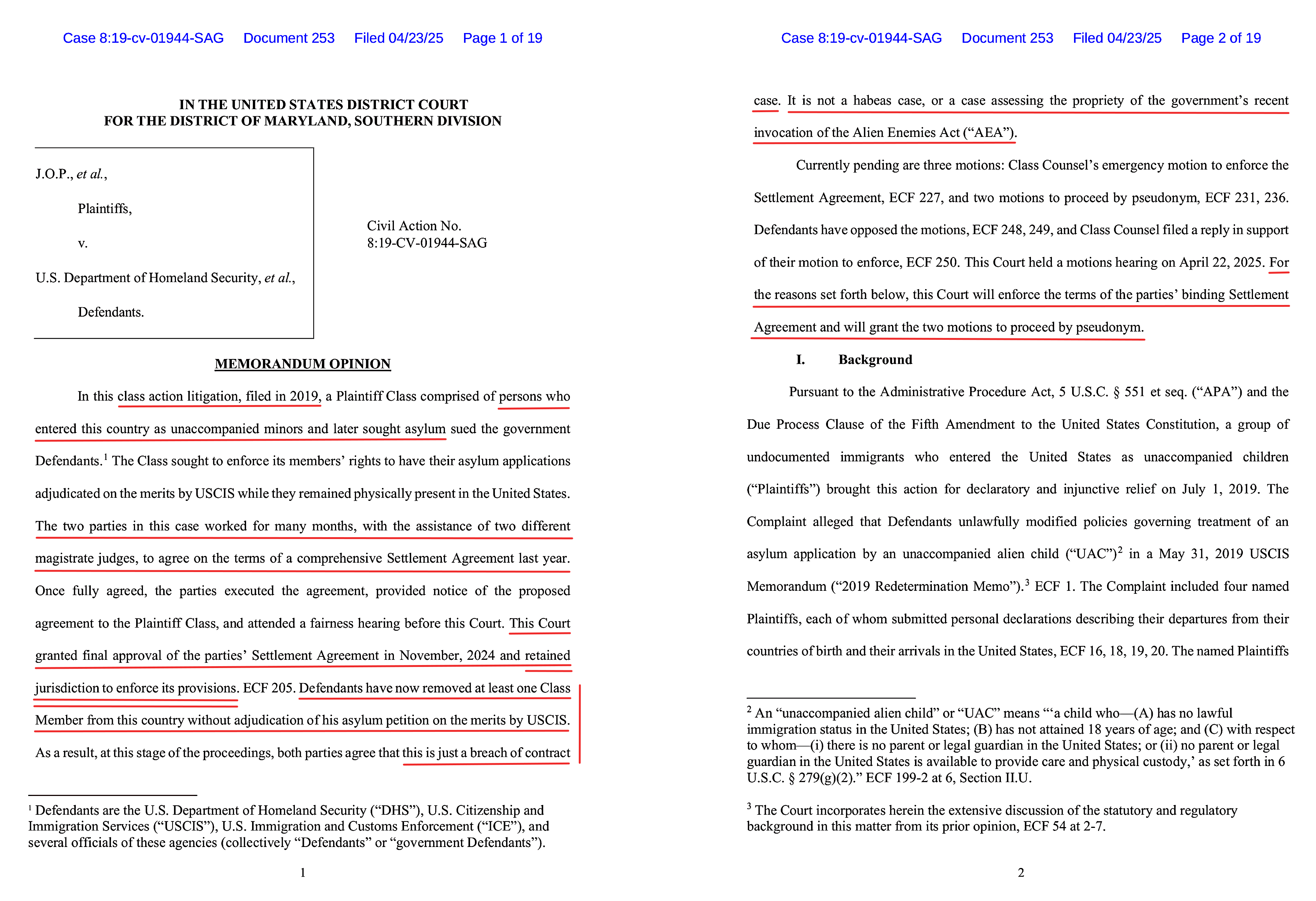Wie zuerst Katherine Faulders, James Hill und Laura Romero für ABC berichteten, hat gestern eine von US-Präsident Trump nominierte US-Bundesrichterin die Rückholung eines weiteren am 15. März nach El Salvor Abgeschobenen angeordnet.
Der von der Richterin Stephanie Gallagher am District Court Maryland entschiedene Fall unterscheidet sich
-
dadurch vom Fall Kilmar Abrego Garcia, daß Abrego Garcia unter Berufung auf ’normales‘ US-Ausländerrecht abgeschoben worden war, während derjenige („Cristian“), um den es in der Gallagher-Entscheidung geht, unter Berufung auf den Alien Enemies Act (AEA) abgeschoben worden war.
-
Von den anderen AEA-Fällen unterscheidet sich der Fall „Cristian“ dadurch, daß ihn eine Vergleichsvereinbarung aus dem vergangenen Jahr vor einer Abschiebung vor Abschluß seins Asylverfahrens schützen sollte.
Die US-Regierung hatte vor Richterin Gallagher unter anderem argumentiert, die Tren de Aragua-Proklamation auf AEA-Grundlage führe dazu, daß „Cristian“ nicht mehr von Vergleichsvereinbarung erfaßt sei:
„his designation as an alien enemy pursuant to the AEA results in him ceasing to be a member of the J.O.P. class [= diejenigen, zu deren Gunsten 2024 die Vergleichsvereinbarung mit der Regierung geschlossen worden war] subject to the settlement agreement. This is because aliens designated as alien enemies pursuant to the AEA are no longer eligible for asylum, a requirement for class membership.“
(http://blogs.taz.de/theorie-praxis/files/2025/04/248.pdf, S. 16)
Dieser Auffassung mochte sich die Richterin nicht anschließen:
„The Class Definition Does Not Exclude Individuals Who are Subject to the AEA.“
(https://storage.courtlistener.com/recap/gov.uscourts.mdd.457483/gov.uscourts.mdd.457483.253.0_2.pdf, Zwischenüberschrift auf S. 6 unten)
Begründung? Die class der von der damaligen Vergleichsvereinbarung Geschützten war 2024 wie folgt definiert worden:
„All individuals nationwide who prior to the effective date of the superseding memorandum discussed in Section III(A) [of the Agreement]: (1) were determined to be a UAC; and (2) who filed an asylum application that was pending with USCIS; and (3) on the date they filed their asylum application with USCIS, were 18 years of age or older, or had a parent or legal guardian in the United States who is available to provide care and physica custody; and (4) for whom USCIS has not adjudicated the individual’s asylum application on the merits.“
(https://storage.courtlistener.com/recap/gov.uscourts.mdd.457483/gov.uscourts.mdd.457483.205.0.pdf, S. 1 f [Nr 2.]; vgl. https://storage.courtlistener.com/recap/gov.uscourts.mdd.457483/gov.uscourts.mdd.457483.203.0.pdf, S. 2 f. [Nr. 4]; Hv. hinzugefügt)
Die entscheidende Formulierung ist „for whom USCIS has not adjudicated the individual’s asylum application on the merits“.
Zu dieser sagt Richterin Gallagher:
„Defendants contend that as to Cristian (and any Class Member against whom the AEA is invoked), ‚prong No. 4 of the class definition is unmet‘ because the ‚AEA invocation moots the asylum application such that USCIS cannot adjudicate‘ and thus ‚adjudication is not pending.‘ ECF 248 at 17. But, nothing in the plain language of the Class Definition or in the larger Settlement Agreement ‚requires that USCIS have a present ability to adjudicate the application on the merits.‘ Id. Rather, the fourth prong of the Class Definition unambiguously states that the Class includes individuals ‚for whom USCIS has not adjudicated the individual’s asylum application on the merits.‘ ECF 199-2 at 5, Section II.E. Section II.B defines ‚[a]djudicate on the merits‘ as ‚to render a decision on the substance of an asylum claim by either granting an approval or issuing a determination of non-eligibility.‘ ECF 199-2 at 4. […].
The Settlement Agreement makes no mention of the AEA. As this Court has stated, ‚[n]othing in the plain language of the Class definition mentions the AEA or exempts any persons otherwise meeting the Class definition from the protections the Settlement Agreement affords.‘ ECF 247 at 3. Allegations that Class Members, like Cristian, are subject to the AEA do not exclude those individuals from the Class under the plain terms of the Settlement Agreement.“
(https://storage.courtlistener.com/recap/gov.uscourts.mdd.457483/gov.uscourts.mdd.457483.253.0_2.pdf, S. 7 f. [von 19 Seiten])
Zur Rechtsfolge ihrer Entscheidung sagt die Richterin weiter unten:
„Defendants have breached the terms of the Settlement Agreement by removing at least one Class Member from the United States while his asylum application remains pending with USCIS. It is an axiomatic principle of contract law that when a defendant breaches a contract, that defendant must restore the situation that existed before the breach. […]. In the case of Cristian, this requires putting him in the position ‚to ensure that his case is handled as it would have been had he not been improperly sent to El Salvador.‘ Noem v. Abrego Garcia, No. 24-A949, 604 U.S. __, 2025 WL 1077101, at *1 (Apr. 10, 2025). In other words, under contract law principles, Cristian, and any other Class Member who has been removed in violation of the Settlement Agreement, must be returned to the United States to await adjudication of his asylum application on the merits by USCIS.“
(https://storage.courtlistener.com/recap/gov.uscourts.mdd.457483/gov.uscourts.mdd.457483.253.0_2.pdf, S. 12, 13;
Noem v. Abrego Garcia, No. 24-A949, 604 U.S. __, 2025 WL 1077101, at *1 = https://www.supremecourt.gov/opinions/24pdf/24a949_lkhn.pdf, S. 2)
Außerdem sagt die Richterin:
„this Court [= Richterin Gallagher] is also guided by, and fully agrees with, the definition of ‚facilitate‘ espoused by Judge Xinis and the United States Court of Appeals for the Fourth Circuit in Abrego Garcia. See No. 8:25-cv-00951, ECF 79 at 4 (D. Md. Apr. 15, 2025) (‚Defendants therefore remain obligated, at a minimum, to take the steps available to them toward aiding, assisting, or making easier Abrego Garcia’s release from custody in El Salvador and resuming his status quo ante.‘); No. 25-1404 (4th Cir. Apr. 17, 2025) (‚›Facilitate‹ is an active verb. It requires steps to be taken as the Supreme Court has made perfectly clear…The plain and active meaning of the word cannot be diluted by its constriction…to a narrow term of art.‘); Abrego Garcia v. Noem, No. 25-1345, 2025 WL 1021113, at *6 (4th Cir. Apr. 7, 2025) (Wilkinson, J. concurring) (noting that removed individuals ‚can be afforded effective relief by facilitation of their return‘). Standing by and taking no action is not facilitation. […].
Thus, like Judge Xinis in the Abrego Garcia matter, this Court will order Defendants to facilitate Cristian’s return to the United States so that he can receive the process he was entitled to under the parties’ binding Settlement Agreement. This Court further orders that facilitating Cristian’s return includes, but is not limited to, Defendants making a good faith request to the government of El Salvador to release Cristian to U.S. custody for transport back to the United States to await the adjudication of his asylum application on the merits by USCIS.“
(https://storage.courtlistener.com/recap/gov.uscourts.mdd.457483/gov.uscourts.mdd.457483.253.0_2.pdf, S. 13 – 15;
No. 25-1404 (4th Cir. Apr. 17, 2025 = https://storage.courtlistener.com/recap/gov.uscourts.ca4.178400/gov.uscourts.ca4.178400.8.0.pdf, S. 3;
Abrego Garcia v. Noem, No. 25-1345, 2025 WL 1021113, at *6 = https://storage.courtlistener.com/recap/gov.uscourts.ca4.178258/gov.uscourts.ca4.178258.13.0_4.pdf [die Formulierung, „can be afforded effective relief by facilitation of their return“, befindet sich auf S. 12; diese ist aber Teil des Mehrheitsvotum und nicht des concurring vote von Wilkinson])
Die Richterin betont in Fußnote 15 auf Seite 6 aber auch:
„Of course, the Settlement Agreement does not entitle Class Members to USCIS approval of an asylum application. The Agreement does not guarantee results, but it does guarantee process.“
Und da für den Fall „Cristian“ die Vergleichsvereinbarung aus dem Vorjahr das Ausschlaggebende ist, ist die Entscheidung keine Entscheidung „assessing the propriety of the government’s recent invocation of the Alien Enemies Act“ (S. 2; s.a. 5 unten: „Plaintiffs are not asking the Court to determine the scope of Defendants’ removal authority under the AEA or challenging the application of the AEA to Cristian or any other individual Class Member“ [Hv. hinzugefügt).

https://storage.courtlistener.com/recap/gov.uscourts.mdd.457483/gov.uscourts.mdd.457483.253.0_2.pdf (19 Seiten)



